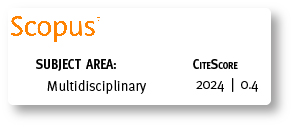La persona como eje principal del negocio inclusivo de reciclaje: una revisión de literatura
Keywords:
economic pyramid base, inclusive business, empowerment, recyclersAbstract
This article reviews the literature on studies developed within recycler population and on empowerment as a variable that could impact their personal, group and organizational development. This population is located at the Base of the Economic Pyramid (BDP) and is related to the generation of the Inclusive Business (NI) concept in which the poor and vulnerable population has an active participation, classified in this way by the economic income it receives. Annually the findings in previous investigations allow to identify the scarcity of information that is generated from the economic and psychological field. Most of the approach focuses on training recyclers to improve the practice in the recycling activity, in their rights, in the vindication of women and the precariousness of the activity that emerges in: children, adolescents, adults and older adults; By not having information from a psychological focus on elements that facilitate growth, personal development or organizational development, the socio-economic situation and opportunities for growth and evolution are unknown.
Downloads
Metrics
References
Alles, M. A. (2014). Dirección estratégica de recursos humanos: Gestión por competencias. (1ª ed.). 177 p. Buenos Aires, Argentina: Ediciones Granica S.A. Disponible en https://jgestiondeltalentohumano.files.wordpress.com/2013/11/direccic3b3n-estratc3a9gica-de-recursos-humanos-gestic3b3n-por-competencias-casos-martha-alles.pdf
AVINA. (2010). Negocios y mercados inclusivos. Definición y marco conceptual para el trabajo de AVINA. Retrieved from http://itemsweb.esade.es/wi/research/iis/pdfs_web/ JornadaSEKN/DefenicionNI-MarcoconceptualAVINA.pdf
Bacqué, M.-H., Biewener, C. (2016). El empoderamiento: Una acción progresiva que ha revolucionado la política y la sociedad. 176 p. GEDISA Editorial.
Cardona, J., Díaz, E., López, Y. (2009). Autocuidado en recicladores-recuperadores informales de Medellín, Colombia, 2005. Revista Facultad Nacional de Salud Pública, 27(3), 309-316.
Ceccarelli, G. (2013). La basura sirve: una experiencia de colaboración entre territorios para la cohesión social en américa latina. Italia. Retrieved from https://www.oxfamitalia.org/wp-content/uploads/2013/10/LaBasuraSirve_@.pdf
Crouch, C. (1996). El problema de la empresa. In: La democracia post-liberal. (pp. 331-350). Fundación Sistema. Retrieved from https://dialnet.unirioja.es/servlet/articulo?codigo=1138037
Diener, E. (2000). Subjective well-being. The science of happiness and a proposal for a national index. The American Psychologist, 55(1), 34-43.
Diener, E., Suh, E., Lucas, R. E., Smith, H. (1999). Subjective well-being: Three Decades of Progress. Psycological Bulletin, 125(2), 276-302.
EMAC. (2015). EMAC apoya el arduo trabajo de los recicladores. Retrieved from http://www.emac.gob.ec/?q=content/emac-apoya-el-arduo-trabajo-de-los-recicladores
Gaiger, L. (2004). Emprendimientos económicos solidarios. In: Cattani, A. (Ed.). La otra economía. (pp. 229-241). Porto Alegre: Editora Veraz Ltda. Retrieved from https://www.economiasolidaria.org/sites/default/files/Laotraeconomia.pdf
INEC. (2017). Encuesta nacional de empleo, desempleo y subempleo. Retrieved from http://www.ecuadorencifras.gob.ec/documentos/web-inec/POBREZA/2017/ Diciembre/122017_Pobreza pdf.pdf
IRR. (2015). Reciclaje inclusivo y recicladores de base en el Ecuador. Ecuador. Retrieved from https://reciclajeinclusivo.org/wp-content/uploads/2016/04/Reciclaje-Inlcusivo-y-Recicladores-de-base-en-EC.pdf
Jimbo, S. (2016). El negocio inclusivo de reciclaje entendido como una estrategia empresarial a desarrollar por la industria manufacturera de papel y cartón en la ciudad de Cuenca - Ecuador. Revista Economía y Política, 114-160. doi: 10.25097/rep.n24.2016.06
Kishor, S., Neitzel, K. (1996). The status of women: indicators for twenty-five countries. DHS Comparative Studies No. 21. Calverton, USA. Retrieved from https://dhsprogram.com/publications/publication-cs21-comparative-reports.cfm
Licandro, O. (2013). El rol de las alianzas intersectoriales en la creación de negocios inclusivos con la base de la pirámide. Un análisis de la experiencia uruguaya mediante el estudio de casos. Retrieved from http://www.lasociedadcivil.org/doc/el-rol-de-las-alianzas-intersectoriales-en-la-creacion-de-negocios-inclusivos-con-la-base-de-la-piramide-un-analisis-de-la-experiencia-uruguaya-mediante-el-estudio-de-casos-oscar-licandro-uruguay/
Licandro, O., Pardo, L. (2013). Experiencias de negocios inclusivos en Uruguay (1ª ed.). Montevideo, Uruguay: Universidad Católica del Uruguay, Fundación Avina.
Mejía-Giraldo, A., Bravo-Castillo, M., Montoya-Serrano, A. (2013). El factor del talento humano en las organizaciones. Ingeniería Industrial, 34(1), 2-11.
Muñoz-Martín, J. (2013). Ética empresarial, responsabilidad social corporativa (RSC) y creación de valor compartido (CVC). Globalización, Competitividad y Gobernabilidad de Georgetown/Universia, 7(3). doi: 10.3232/GCG.2013.V7.N3.05
Olmedo-Barchelo, S., Achinelli, M., Ayala, D. (2015). Empoderamiento económico de las mujeres artesanas paraguayas en los departamentos de central, Guairá y Cordillera. Un análisis a través del estado del arte. Revista Desarrollo Económico, 2(4), 254-265.
Parra, F. (2017). Manifestación en Bogotá por el día mundial del reciclador. Alianza Global de Recicladores. Retrieved from http://globalrec.org/es/2017/03/01/manifestacion-en-bogota-por-el-dia-mundial-del-reciclador/
Pick, S., Sirkin, J., Ortega, I., Osorio, P., Martínez, R., Xocolotzin, U., Givaudan, M. (2007). Escala para medir agencia personal y empoderamiento (ESAGE). Interamerican Journal of Psychology, 41(3), 295-304.
Pineda, M., Falla, P. (2016). Los negocios inclusivos como fuente de trabajo de calidad para pequeñas empresarias en condición de pobreza: un estudio exploratorio en el municipio de Apartadó, Colombia. Equidad y Desarrollo, (25), 179-208. doi: 10.19052/ed.3529
Prahalad, C. K., Hammond, A. (2005). Atender a los pobres del mundo, rentablemente. Harvard Business Review, 83(8), 87-99.
Prahalad, C. K., Hart, S. (2002). The fortune at the bottom of the pyramid. Strategy+business, (26), 1-14. Retrieved from https://www.susana.org/en/knowledge-hub/resources-and-publications/library/details/692
Rappaport, J. (1987). Terms of empowerment/exemplars of prevention: toward a theory for community psychology. American Journal of Community Psychology, 15(2), 121-148.
Robbins, S., Judge, T. (2013). Comportamiento organizacional (15th ed.). México: Pearson Prentice Hall. Retrieved from http://www.academia.edu/14013625/ comportamiento_organizacional_robbins_15_edicion
Sen, A. (1985). Well-being, agency and freedom: The Dewey Lectures 1984. The Journal of Philosophy, 82(4), 169-221. doi: 10.2307/2026184
Solíz, M. (2014). Exposición, vulnerabilidad y perfil epidemiológico de trabajadores informales en el botadero a cielo abierto del cantón Portoviejo, Ecuador. Maskana, 5(1), 57-79.
Zimmerman, M. A. (1995). Psychological empowerment: Issues and illustrations. American Journal of Community Psychology, 23(5), 581-599. doi: 10.1007/BF02506983
Downloads
Published
How to Cite
Issue
Section
License
Copyright © Autors. Creative Commons Attribution 4.0 License. for any article submitted from 6 June 2017 onwards. For manuscripts submitted before, the CC BY 3.0 License was used.
![]()
You are free to:
 |
Share — copy and redistribute the material in any medium or format |
 |
Adapt — remix, transform, and build upon the material for any purpose, even commercially. |
Under the following conditions:
 |
Attribution — You must give appropriate credit, provide a link to the licence, and indicate if changes were made. You may do so in any reasonable manner, but not in any way that suggests the licenser endorses you or your use. |
| No additional restrictions — You may not apply legal terms or technological measures that legally restrict others from doing anything the licence permits. |









